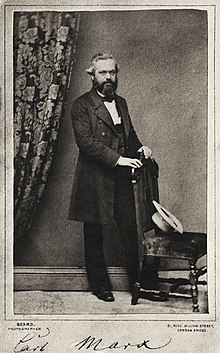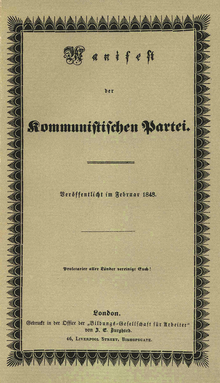League of Communists
The League of Communists was a revolutionary-socialist association founded in London in 1847 as a secret society with international aspirations. It emerged from the previously existing League of the Just , founded by Wilhelm Weitling . The renaming took place under the influence of Karl Marx , Friedrich Engels and Wilhelm Wolff . The Communist League existed until 1852 . It is considered to be the nucleus of the later socialist and communist parties in the world and a forerunner organization of the International Workers 'Association (IAA), which was also inspired by Marx and Engels in 1864 and is now also referred to as the "first international " of the workers' movement .
History of the covenant
Prehistory and initial phase
The previously existing Union of the Righteous had already emerged in Paris in 1836 on the initiative of the tailor Wilhelm Weitling , who had emigrated to France, from the secret society of the Union of Outlaws , which had existed since 1834 . Under Weitling's leadership, the federation, which until then had been dominated by petty-bourgeois intellectuals, had acquired an early revolutionary-socialist and proletarian orientation.
The renaming of the League of the Just in the League of Communists was the result of two congresses in 1847. Here, Karl Marx and Friedrich Engels, who joined the League in the same year, brought their ideas together with Wilhelm Wolff . In doing so, they initiated a substantive realignment of the federal government. They drafted a self-contained program for the federal government and emphasized its internationalist character. The Marxist motto proletarians of all countries, unite! became the determining motto.
At the second federal congress from November 29th to December 8th, 1847 representatives from 30 local groups from France , the Netherlands , the states of the German Confederation , Sweden , Switzerland , Great Britain and the USA took part. Marx and Engels were tasked with drafting the Communist Party's manifesto . They submitted it for publication in February 1848. The Communist Manifesto essentially called the workers to international class struggle against the ruling bourgeoisie under capitalism . The aim was to establish a classless (communist) society . Later, Marx elaborated the basic ideas in a more differentiated way in his main work, Capital with Political Economy . This view gradually became the basis of communism in the future .
Most of the approximately 500 members of the League of Communists had emigrated from the German states or were expelled craftsmen because of their political stance . Due to the repressive political conditions during the time of the Restoration between 1815 and 1848, they had fled abroad. The federal members who remained or returned in the German principalities tried to set up regional workers' associations . There were similar efforts in other countries. Because of the small number of their supporters and because of political persecution and oppression, they were initially only marginal phenomena. With the beginning of the bourgeois revolutions of 1848 , especially in France and the German states, the influx increased somewhat.
The federal government during the bourgeois revolutions of 1848/49
In 1848 the federal headquarters were relocated several times within a few months, first from London for a short time to Brussels in Belgium , and after the beginning of the February Revolution in France, to Paris . There Marx and Engels also formally took over the leadership of the federal government. After the revolution had spread to Germany ( March Revolution ), the headquarters was relocated to the then Prussian city of Cologne in April 1848 . There, Karl Marx founded the Neue Rheinische Zeitung ( NRhZ ), in which Friedrich Engels worked alongside others. Marx was involved in the Cologne workers' association .
With their critical articles and comments on the revolutionary events, Marx and Engels tried in vain to steer the bourgeois revolution, which was shaped by the ideas of liberalism and demands for a national unity of the German Confederation, in a socialist direction. For example, they vehemently criticized the efforts of a moderate majority in the Frankfurt National Assembly , the so-called “Halben”, to establish the German nation-state to be founded as a constitutional monarchy with liberal reforms. Marx and Engels, on the other hand, favored the proclamation of a republic based on the example of France. In the Frankfurt National Assembly, Wilhelm Wolff was a representative of the federal government in the Donnersberg parliamentary group , the radical democratic left . In April 1849, Marx and Engels tried to gather the members of the Federation who were active in various workers 'groups and democratic associations, initially in the Rhineland , in order to prepare a general German workers' congress.
With the failure of the Imperial Constitution passed in the Frankfurt National Assembly as a result of the rejection of a German imperial crown by Prussia's King Friedrich Wilhelm IV at the end of April 1849 (see Imperial Deputation ), the National Assembly in the Frankfurt Paulskirche dissolved. The remaining MPs, mostly from the political left, avoided the so-called rump parliament in Stuttgart . The precipitous events with the radical democratically motivated imperial constitution campaign on the one hand and the massive counterrevolution against it by, above all, the Prussian military on the other, thwarted the plan of Marx and Engels, since there were now other priorities for the left-wing revolutionary movement.
Many members of the federal government in the German states took part in the civil war-like struggles that escalated again in the May uprisings of 1849 to enforce the democratic gains of the revolution, especially in Saxony ( Dresden May uprising ) , the Palatinate (Bavaria) ( Palatinate uprising ) and in Baden (see Baden Revolution ), where on June 1, 1849, a short-term Baden Republic was proclaimed. The NRhZ stopped its publication on May 19, 1849, when the uprisings in the Prussian Rhine provinces ( Iserlohner and Elberfeld uprising ) were put down. Engels was still actively fighting on the side of the revolutionaries in the defense of the Baden republic. When the Baden Revolution was suppressed on July 23, 1849 with the capture of the federal fortress of Rastatt by Prussian troops, the March Revolution had failed as a whole.
Many members of the Communist League had to emigrate again because of this defeat . Marx and Engels went to London. There, the federal government was reorganized into a new central authority. At this time, Wilhelm Liebknecht , who later co-founded the Social Democratic Party of Germany ( SPD ), joined the Communist League. Liebknecht was forced to emigrate through his participation in the Baden Revolution, which also led him to London via Switzerland. There, under the influence of Marx and Engels, he moved closer to the Marxist positions on which the SPD of the 19th century and its predecessor parties from 1869 were oriented.
In 1850, the tasks of the federal government were redefined after the experiences of the March Revolution. Marx and Engels did not expect a new revolution after, alongside a new phase of political reaction, an economic boom had slowed the revolutionary energies of the left. Members of the Federation remained in the German states still in active labor organizations, and took effect on 3 September 1848 the initiative of the typesetter Stephan Born founded General German Workers' Brotherhood . This was the first national workers' association in Germany to initiate the development of the trade unions .
Decline and dissolution
Some members of the central authority who gathered around Karl Schapper and August Willich could not share the resigned-looking conclusion of Marx / Engels. The federal government had thus split into two opposing camps. In September 1850, Marx and Engels were excluded from the Bund by the Schapper / Willich faction. By founding your own central authority in Cologne, you would have violated the statutes. In addition, the other members accused them of “half-scholarly political daydreams”.
In March 1851 some documents of the Bund der Deutschen Länder fell into the hands of state authorities. In the ensuing wave of arrests, the federal government was significantly weakened. Leading members of the federal government were sentenced to long prison terms in the fall of 1852 in the so-called Cologne Communist Trial. After this severe defeat, the Bund was dissolved in November at the request of Karl Marx. He declared “ ... the continuation of the Federation on the continent is no longer appropriate. "
Congresses of the League of Communists
- 1847, June 2-9, first Congress in London
- 1847, November 29th to December 8th, Second Congress in London
Further development
It was not until the 1860s that there was a new upswing in the labor movement, when party-political organization of the labor movement began across Europe. The corresponding socialist organizations and parties, which still encompass a very broad spectrum, formed a new attempt to unite the workers 'movement internationally with the International Workers' Association founded in 1864 .
See also
literature
- Karl Marx and Friedrich Engels: The Communist Manifesto. 1848 and later editions see Communist Party's Manifesto .
- Carl Grünberg : The London Communist magazine and other documents from the years 1847-1848 . In: Archives for the History of Socialism and the Labor Movement . Edited by Carl Grünberg. Leipzig 1921. Volume 9, pp. 249–341. Digitized
- Karl Obermann : On the history of the League of Communists from 1849 to 1852. Dietz, Berlin 1955.
- Bert Andréas (Ed.): Founding documents of the League of Communists (June to September 1847). Dr. Ernst Hauswedell & Co, Hamburg 1969 (publications from the Hamburg State and University Library. Vol. 7).
-
The League of Communists. Documents and materials. Editors Herwig Förder, Martin Hundt , Jefim Kandel, Sofia Leviowa.
- Volume 1. 1836-1849. Dietz Verlag, Berlin 1970.
- Volume 2. 1849-1851. Dietz Verlag, Berlin 1982.
- Volume 3. 1851-1852. Dietz Verlag, Berlin 1984.
- Jacques Grandjonc; Karl-Ludwig König and Marie-Ange Roy-Jacquemart (eds.): Statutes of the “ Communist Workers Education Association ” London 1840–1914. Trier 1979 (= writings from the Karl-Marx-Haus issue 23).
- Martin Hundt (Ed.): Bund der Kommunisten 1836-1852. Akademie-Verlag, Berlin 1988, ISBN 978-3-05-000549-2
- Martin Hundt: History of the League of Communists 1836-1852 – Philosophy and History of Science. Peter Lang, (Studies and Sources Vol. 3), Frankfurt / M. 1993.
- The Communist Manifesto (Manifesto of the Communist Party) by Karl Marx and Friedrich Engels. From the first edition to the reading edition. With an edition report by Thomas Kuczynski . (= Writings from the Karl-Marx-Haus . Issue 49) Trier 1995.
Web links
- Friedrich Engels: " On the History of the League of Communists "; on mlwerke.de
- Friedrich Engels: " The Communist Trial in Cologne "; on mlwerke.de
- German revolutionary associations abroad (from the League of Outlaws to the League of the Just to the League of Communists) ; Chapter from Max Beer : General History of Socialism and Social Struggles , with additions by Dr. Hermann Duncker , pages 504-515
Notes / individual evidence
- ^ R. Grau, E. Illgen, L. Kaulisch: Appendix . In: Institute for Marxism-Leninism at the Central Committee of the SED , History of the German Labor Movement , Biographical Lexicon, p. 507, Dietz Verlag , Berlin 1970.





